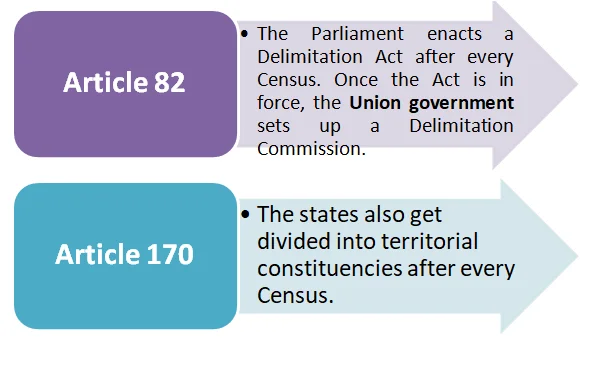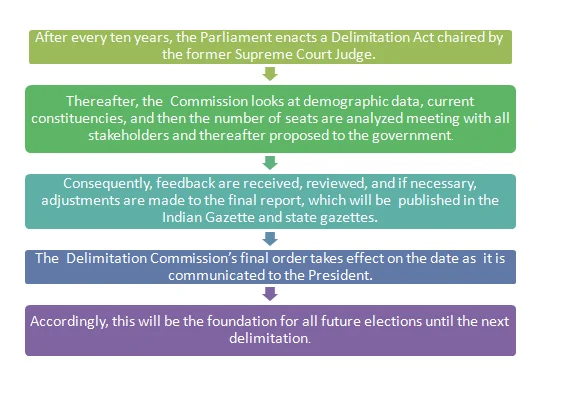Delimitation refers to the process of redrawing the boundaries of electoral constituencies to reflect changes in population. In India, this process ensures that every region receives fair representation in the Lok Sabha and State Assemblies. Conducted periodically, delimitation is essential for maintaining the principle of “One Vote, One Value.” It helps create equal constituencies, thereby enhancing the democratic process.
Enroll now for UPSC Online Course
The Delimitation Process in India: History, Challenges, and Future Prospects
Delimitation in India: Definition and Context
- Definition: The term Delimitation literally denotes the act or process of fixing limits or boundaries of territorial constituencies in a country to represent changes in population.
- Delimitation in the Indian Context: As per Indian context, the exercise of redrawing the boundaries of Lok Sabha and Legislative Assembly Constituencies in a region is known as delimitation.
- Variation in Seat Allocation: During this process, the number of seats allocated to a particular state/UT in Lok Sabha or in the Legislative Assembly may vary.
- Example: Delhi being a union territory with legislative assembly has 7 Lok Sabha constituencies while in the Legislative Assembly it has 70 constituencies.
Need of Delimitation
- Equal Representation: It provides for equal representation to every section of the population.
-
- Fair Division of Geographical Areas: This helps in fair division of geographical areas so that one political party doesn’t have an advantage over others in an election.
- Principle of “One Vote One Value”: It follows the principle of “One Vote One Value.
Constitutional Provisions

Historical Overview of Delimitation Exercises in India
- Introduction to Delimitation: The first delimitation exercise was carried out by the President with the help of the Election Commission in 1950-51.
- The Delimitation Commission Act was enacted in 1952.
- Historical Background of Delimitation Commissions: Delimitation Commissions have been set up four times — 1952, 1963, 1973, and 2002 under the Delimitation Commission Acts of 1952, 1962, 1972, and 2002, enacted by the Parliament.
- Freezing of Seats: The 42nd Amendment Act of 1976 froze the allocation of seats to the states in the Lok Sabha and the division of each state into constituencies until the year 2000 at the 1971 levels.
- Delimitation and Census Gaps: There was no delimitation after the 1981 and 1991 Censuses.
- Extended Freezing of Seats: The 84th Amendment Act of 2001 extended this freezing of seats for another 25 years, i.e., up to the year 2026.
- This act also provided for the government to readjust constituencies in the state based on the 1991 census.
- Recent Amendments and Their Implications: The 87th Amendment Act of 2003 provided for the delimitation of constituencies based on the 2001 census, but this was done without altering the number of seats allotted to each state in the Lok Sabha.
- Delimitation Commission of 2002: The Delimitation Act, 2002, was enacted to set up a Delimitation Commission for adjustment of constituencies based on the 2001 census.
- The Delimitation Commission of 2002 left out a few states including Assam, Arunachal Pradesh, Nagaland, and Manipur.
- Re-fixing Reserved Seats: The 2002 Commission (under Articles 330 and 332 of the Constitution) re-fixed the number of seats reserved for Scheduled Castes (SCs) and Scheduled Tribes (STs) in the Lok Sabha and the Legislative Assemblies of the states, based on the 2001 census.
- Future Prospects: The next Delimitation Commission will be set up based on the next published census after 2026.
Composition and Appointment of Delimitation Commission
- Composition
-
- Chairperson-A Retired Supreme Court judge
- The Chief Election Commissioner
- Respective State Election Commissioners
- Appointment: It is appointed by the President Of India and works in collaboration with the Election Commission of India. An act of the Parliament sets it up.
Functions
- Determination of Constituencies: It determines the number and boundaries of constituencies to make the population of all constituencies nearly equal.
- Reservation of Seats: It identifies seats reserved for Scheduled Castes and Scheduled Tribes, wherever their population is relatively significant .
Powers
- Submission of Orders: The Commission’s orders are laid before the Lok Sabha and the legislative assemblies concerned, but they cannot affect any modifications in the orders.
- Majority Opinion: If there is a difference of opinion among members of the Commission, then the opinion of the majority prevails.
- Legal Authority: It is a high power body whose orders have the force of law and cannot be called in question before any court.
Process of Delimitation

Challenges with Delimitation
- Regional Disparity: Some states, especially in the south, have expressed their dissatisfaction with the delimitation based on population, as it would reduce their representation and influence in the Lok Sabha and the Rajya Sabha.
- They argue that this would penalise them for their efforts in population control and development, and reward the states that have failed to do so.
- On the other hand, without regular delimitation there may be dilution of the principle of one citizen – one vote.
- Political Bias: There have been concerns that the delimitation process can be influenced by political considerations, leading to gerrymandering, where constituencies are drawn to favour a particular political party.
- This can undermine the fairness and impartiality of elections.
- Lack of Transparency: The delimitation process often lacks transparency, with limited opportunities for public participation and scrutiny.
- This can raise concerns about the fairness and accountability of the process.
- Inadequate Consideration of Geographical Features: The delimitation process sometimes does not adequately consider geographical features, such as rivers, mountains, or natural boundaries.
- This can lead to constituencies that are difficult to manage or that split communities along natural lines.
Steps to be Taken
- Building Consensus: A national consensus exercise should be started to sort out issues before 2026.
- Adopting Alternative Delimitation Criteria: In addition to population data, other factors such as geographical features, communities of interest, and historical boundaries should be considered in the delimitation process.
Delimitation Commission for Jammu & Kashmir
Historical Background
- Delimitation Governance in Jammu and Kashmir: The erstwhile state of Jammu and Kashmir, the delimitation of Lok Sabha seats was governed by the Indian Constitution, but the delimitation of its Assembly seats was governed separately by the Jammu and Kashmir Constitution.
- Abrogation of Article 370: On August 5, 2019, the abrogation of Article 370 occurred, leading to Jammu and Kashmir losing its special status as a state and transitioning into a Union Territory.
- Establishment of the Delimitation Commission: In March 2020, the Union government set up a Delimitation Commission tasked with the delimitation process for the Union Territory of Jammu and Kashmir, aiming to complete the process within a year to facilitate the holding of the J&K Legislative Assembly elections.
Key Recommendations of the Delimitation Commission on J&K are
- Increase in Assembly Seats: The number of assembly seats in the union territory has been increased from 83 to 90, with six additional seats for the Jammu region and one for the Kashmir region.
- Division of Parliamentary Constituencies: The five parliamentary constituencies in J&K have been divided equally among the two regions, with each having 18 assembly segments.
- Reservation for Scheduled Castes and Scheduled Tribes: The commission has proposed to reserve seven seats for Scheduled Castes and nine seats for Scheduled Tribes, which is a first for the erstwhile state.
- Special Provisions for Migrants and Displaced Persons: The commission has also recommended two seats for Kashmiri migrants and one seat for displaced persons from Pakistan-occupied Kashmir.
- Revision of Constituencies: The commission has revised the names and boundaries of 28 new constituencies and deleted 19 existing ones.
Enroll now for UPSC Online Course
| Must Read | |
| Current Affairs | Editorial Analysis |
| Upsc Notes | Upsc Blogs |
| NCERT Notes | Free Main Answer Writing |
Conclusion
The delimitation process plays a crucial role in ensuring fair representation for all citizens in India.
- While it faces challenges such as political bias and regional disparities, ongoing reforms and public participation can enhance its effectiveness.
- As new census data becomes available, it is vital to approach future delimitation exercises with transparency and inclusiveness. This will help uphold the integrity of India’s democratic framework and promote equitable representation for all regions.
Sign up for the PWOnlyIAS Online Course by Physics Wallah and start your journey to IAS success today!
| Related Articles | |
| Delimitation | The Speaker of Lok Sabha |
| Election Commission of India: Its Members, Power and Functions | List of Presidents of India 1947 to 2023 |

 GS Foundation
GS Foundation Optional Course
Optional Course Combo Courses
Combo Courses Degree Program
Degree Program









